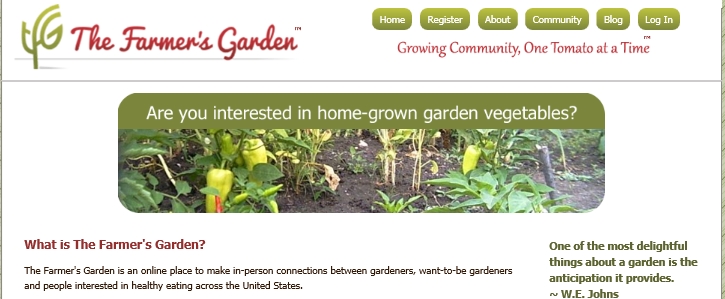If you are thinking about planting, or have already planted, your vegetable garden this year, you can also make a side income by selling your extra produce to others. Several online websites cater to “entrepreneur gardeners” who are interested in selling or bartering off their excess produce.
- Inbox Dollars - Get paid to check your email. $5 bonus just for signing up!
- Survey Junkie - The #1 survey site that doesn't suck. Short surveys, high payouts, simply the best.
- Nielsen - Download their app and get paid $50!
The Farmer’s Garden
Once you complete your free registration with The Farmer’s Garden, you can use the site to post classified ads of your excess garden produce, homemade goods or gardening tools. Payments occur in person or through off-site third-party sites such as Paypal.
The Farmer’s Garden can also be used to post ads of your unused garden plot. This might be worthwhile if you can no longer garden but would still like to enjoy fresh produce from your own land.
Zukeeni
On this site, gardeners can register themselves by inputting their names, addresses, and the produce they wish to sell. There are also fields to fill in regarding produce quantity, desired price, and selling time range. Much like Craigslist, you create individual listings for your goods and fill in specified areas with pricing, amount, and other information.
Payments and transaction locations are set between you and your buyer. Zukeeni does offer Venmo as an online payment option, however. Venmo is kind of like Paypal and can be linked to your bank account.
Zukeeni also offers lots of useful advice and tools to gardeners about what to plant for their geographic region (and when), non-chemical fertilizers and pesticides, watering schedules, planting layouts, and more.
Keep in mind that Zukeeni requires that all sold food be raised organically; i.e., without the use of chemical fertilizers and pesticides. Prepared foods like jams and canned sauces need to comply with state and local food selling laws.
Craigslist
Craigslist has definitely gained a reputation for harboring unsavory characters that you would not want showing up to your house. Having said that, if you still wish to use this online marketplace, you can team up with a buddy and meet potential buyers of your garden produce either at your home or elsewhere in town. The benefit of this approach is that you’ll encounter a much larger customer base that will purchase your homegrown and homemade goods. Just be careful.
Nextdoor
This site isn’t a gardening site per se; rather, it’s a neighborhood site that helps neighbors communicate with one another about area events, crime and job opportunities. You can learn if your neighborhood subscribes to Nextdoor by searching here.
If your neighborhood does subscribe to Nextdoor, you can create postings that advertise your ultra local produce and offer it in exchange for money or other services (such as lawn mowing while you’re away on vacation).
What’s great about Nextdoor is that you’re more likely to get trustworthy clientele that pay you on the spot and even advertise your produce to others through word-of-mouth. You also won’t have to travel far to deliver your goods- in fact, your next door neighbor might just come to your doorstep to buy your tomatoes or cucumbers.
Co-op grocery stores
Many cities and towns feature co-op businesses, including grocery stores, that are operated by member shareholders. If you are a member of a co-op grocery, you can probably sell your excess garden produce to the store. For more information on getting started, you may wish to read the following guide.
Keep in mind that, if you do get accepted as a seller in your local co-op, some rules and regulations may apply to what you can sell and in what quantities. Many co-ops require that sold produce is raised organically. Other co-ops require large amounts of produce at set intervals, so you’ll need more than just an extra bag of carrots to get started.
How to make more even money with your garden produce.
Unless you have a sizable garden, you won’t make much cash from your unwanted/extra produce. However, you can make a steady, year-long income if you capitalize on your extra produce and turn it into jams, jellies and sauces first. For example, a bag of heirloom tomatoes may fetch you just $10; however, once those heirlooms are transformed into marinara sauce, you could get $10-$20/jar.
You will need to read up on your state’s cottage laws before you start selling prepared foods. However, most states allow a given amount of home-prepared foods to be sold to the public without the need for health department inspections and/or commercial kitchen use.
If you don’t want to bother with food preparation, you can also earn more money by offering something to the public that’s not seen in most grocery stores. For example, the common Roma tomato is a dime a dozen in August. However, heirloom Black Crim tomatoes are hardly, if ever, available at the grocery store. If you plant just these tomatoes and sell them even in August, you are bound to find many interested parties.
Making money from your garden
In summary, keeping a garden can actually be a profitable venture if you select produce that’s in demand and that’s typically not available at area grocery stores. There are several online sites that enable you to sell your produce and other goods. With some forethought and planning, your garden can actually make you a decent side income during the summer months.






